
24 Aug Telluride Museum: Another No-Miss “Evening with Ken Burns,” 8/24/25!
The Telluride Historical Museum once again presents “An Evening with Ken Burns.” This year’s program features Episode 3 from the documentary series “Country Music.” Event takes place Sunday, August 24. Doors: 5:30 pm; screening, 6:00 pm, Michael D. Palm Theatre. The evening includes the screening, post-film Q&A, and book/DVD signing.
Find out why historians say more Americans get their history lessons from Ken’s films than from any other source.
Tickets $20 for museum members; $25 for non-members; $5 for students. Tickets here.
Please scroll down to listen to TIO’s most recent podcast with Ken Burns.
And go here for more on Ken Burns in Telluride.
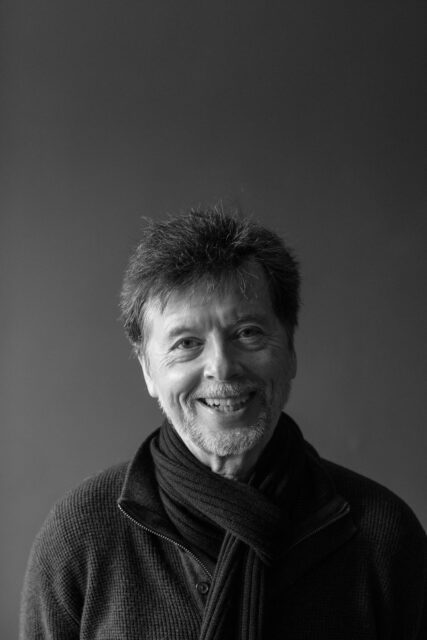
Ken Burns, credit, Michael Avedon (2022).
Connecting the dots between his soon-to-be-released “The American Revolution” and country music would appear to be a Sisyphean task. However, the nexus of the two comes down to a simple statement about what the director has repeatedly said motivates him:
“A good story about American history firing on all cylinders, stories like these that answer the questions about who we are, why we are the way we are, and why we are not the way we are not,” said Ken Burns in a previous interview with Telluride Inside…and Out.
The evening begins with a screening of “County Music,” Episode 3 titled “The Hillbilly Shakespeare.”
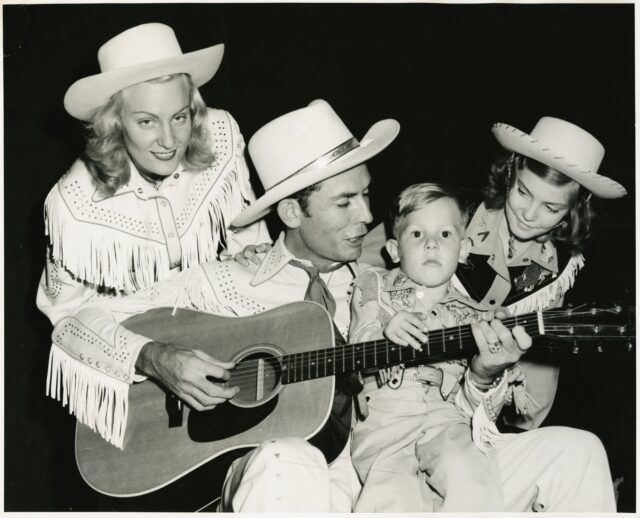
Hank Williams with his wife Audrey and children Hank Jr. and Lycretia, 1951. Credit: Marty Stuart Archives.
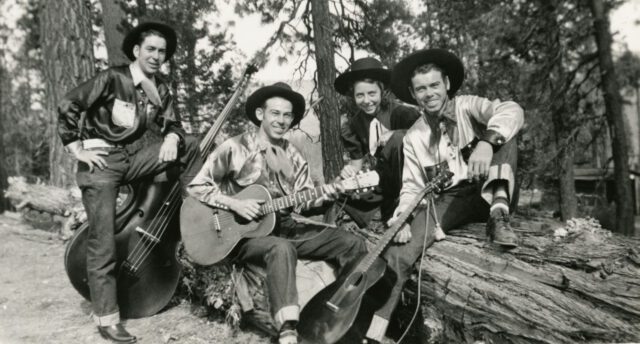
The Maddox Brothers and Rose, c.1938. From left: Fred, Cliff, Rose, and Cal Maddox. Credit: Thomas Sims Archives.
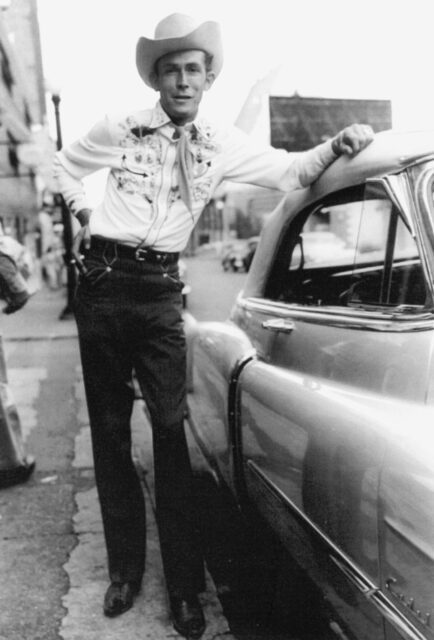
Hank Williams, c.1950. Credit: Kent Archives
The focus of “The Hillbilly Shakespeare” is on a significant turning point in the genre’s history, when the signature sound of country music moved from primarily acoustic to incorporating electric, including guitars, driving bass lines, and other amplified instruments.
The more complex, sometimes controversial themes such as drinking, cheating, loneliness and heartbreak are all linchpins in the life and times of Hank Williams, whose personal struggles get the full monty in the segment.
The combination of electric sounds and electrifying subject matter purportedly appealed to much wider audience than early Country. Denizens of noisy beer halls and honky-tonks loved hearing about such topics, previously considered taboo.
Bottom line: Episode 3 of “Country Music” helped solidify the importance of electric instrumentation, powerful songwriting, and emotional honesty in country music, influencing the sound, style, and lyrical content of generations of artists who followed.
“Men had been to war. Women had been to work. The divorce rate was hitting record levels,” Country Music asserts. “Songs that dealt openly about cheating and drinking — topics once considered beyond the pale of respectability — were as popular as songs with more traditional themes.”
Fast forward to the present, Ken Burns’ latest series, “The American Revolution,” debuts on PBS in November 2025, a date which coincides with the 250th anniversary of the start of the Revolution.
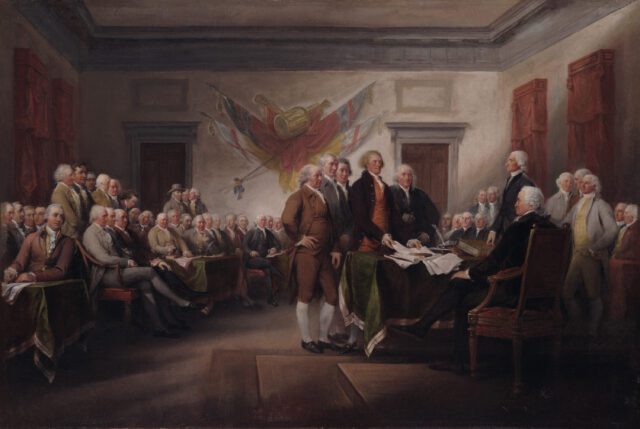
The Declaration of Independence, July 4, 1776. Painting by John Trumbull, 1818. Credit: Yale University Art Gallery
The timing, while not planned to jibe with contemporary political movements like “MAGA,” inevitably creates a parallel with current debates about American identity and values. But that is merely a lucky coincidence since “The American Revolution” has been in development for eight years.
The series explores the complexities and contradictions of the revolution, offering a nuanced perspective on the nation’s founding ideals as it grapples with unimaginable challenges.
Burns and his co-directors, Sarah Botstein and David Schmidt, began working on the film before Donald Trump’s first term as President. However, the film’s premiere arrives during a period of intense political polarization in the United States, which some observers compare to the divisions during the Revolutionary period itself.
Burns and his associates acknowledge the parallel, stating that they often find their historical narratives “rhyme with the present.”
Ultimately, the timing of Ken Burns’ “The American Revolution” offers an opportunity for reflection on the nation’s past and its relevance to the present political climate. Its emphasis on diversity is particularly noteworthy: “The American Revolution” includes stories from Native Americans, African Americans, Loyalists, women, and children alongside those of the well-known Founding Fathers.
Summing up “The American Revolution” shares with Ken Burns’ other documentaries a commitment to showcasing the richness and complexity of American history through meticulous research; diverse perspectives; powerful storytelling techniques; and the artist’s distinctive visual and aural style.
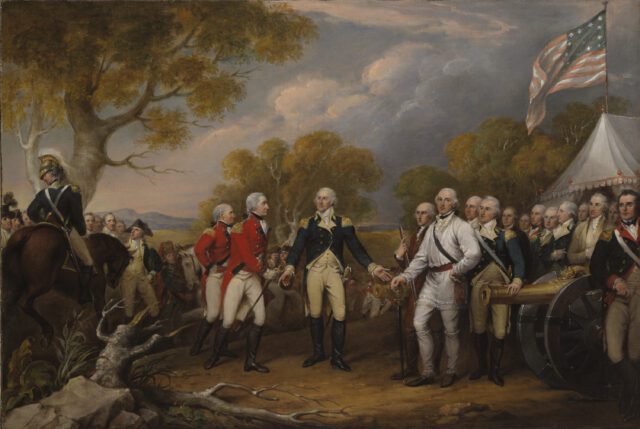
The Surrender of General Burgoyne at Saratoga, October 16, 1777. By John Trumbull, 1822…1832
British Lieutenant General John Burgoyne hands his sword in surrender to American Major General Horatio Gates, at center.
battle of Saratoga
Footnote: The American Revolution” is narrated by Peter Coyote, but also includes the first-person voices of nearly 200 individual historic figures, one of whom is depicted by locally born and raised rising star Charlotte Hacke, daughter of local celeb Baerbel Hacke. Her name shows up in the credits just above Tom Hanks.
For more, check out TIO’s podcast with Ken Burns:
Ken Burns, more:
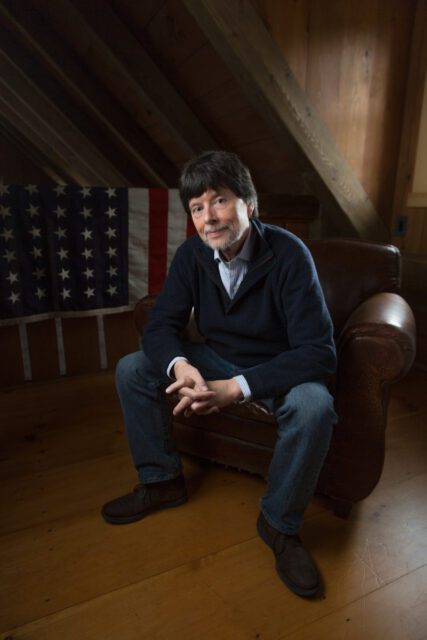
Ken Burns, credit, Evan Barlow (2018)
Ken Burns claim to fame can be summed up in a nutshell: his ability to craft compelling narratives that draw viewers in and make history accessible and relatable.
The award-winning documentary filmmaker known for his work on periods in American history and American culture. Often produced with WETA-TV and the National Endowment for the Humanities for broadcast on public television by PBS (Public Broadcasting Service), his films and television miniseries celebrate and examine the American experience with an unflinching eye.
In Telluride, Burns is an honorary homie. The iconic filmmaker has a 30+-year relationship with our town, which he is known to describe shamelessly as “my lover.”
Since the Academy Award-nominated “Brooklyn Bridge,” Burns went on to direct and produce some of the most acclaimed historical documentaries ever made, recounting the histories of jazz, the Civil War, baseball, Prohibition, the decade-long calamity known as The Dust Bowl, the Roosevelts, the Vietnam War and the history of country music.
Burns has a well-deserved global reputation for in-depth meditations on Americana, projects on which he often wears many hats: writer, cinematographer, editor, and music director – in addition to producing and directing.
Many of his celebrated documentaries premiered at the Telluride Film Festival, which Burns has described as “the best festival on the planet” and where he now serves on the board. Examples include ”Huey Long,” 1985; “The Civil War,” 1990; “Baseball: The Tenth Inning,” 1994; “Frank Lloyd Wright,” 1998; “Jazz,” 2001; “Horatio’s Drive: America’s First Road Trip,” 2003; “The War,” 2007; “The Central Park Five,” 2013.
Two of Burns’ films screened at Telluride’s other major film-centric event, Mountainfilm, which debuted “The National Parks: America’s Best Idea,” 2009, and “The Dust Bowl,” 2013.
Wynton Marsalis once described Ken Burns as follows: “…a master of timing, and of knowing the sweet spot of a story, of how to ask questions to get to the basic human feeling and to draw out the true spirit of a given subject.”
Burns’s films have won 14 Emmys and three Peabody Awards.
In 2008, the filmmaker received a Lifetime Achievement Award from the Academy of Television Arts & Sciences.


Sorry, the comment form is closed at this time.